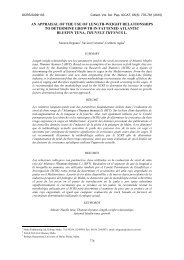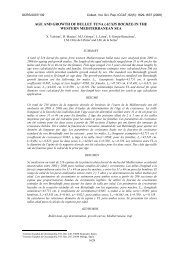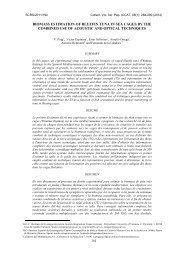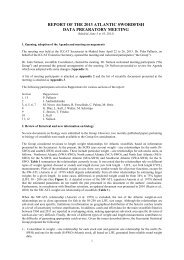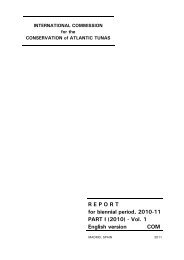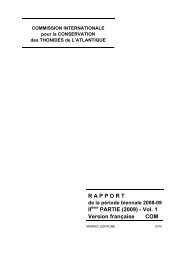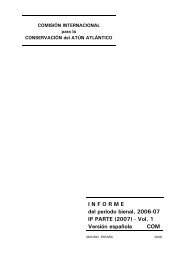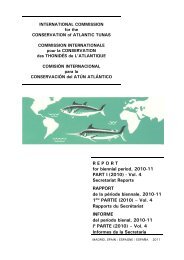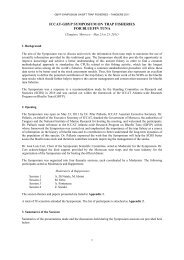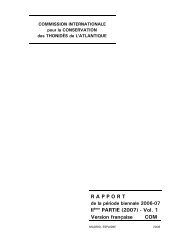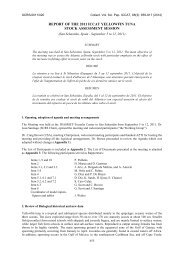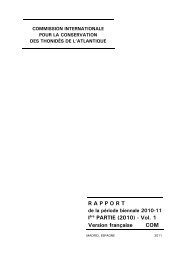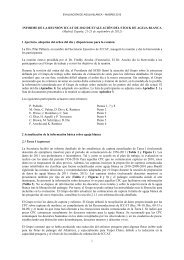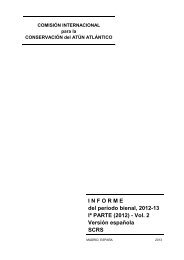E - Iccat
E - Iccat
E - Iccat
You also want an ePaper? Increase the reach of your titles
YUMPU automatically turns print PDFs into web optimized ePapers that Google loves.
ICCAT REPORT 2002-2003 (II)<br />
Even in case where catch limits/quotas are in effect, landing inspection at ports is much more effective than<br />
boarding inspection at sea particularly for small fishing vessels producing fresh tunas and frequently returning to<br />
ports. Boarding inspection should also be avoided for those vessels.<br />
Boarding inspection at high seas by the third party other than flag CPCs should be focused upon the fishing<br />
vessels whose flag CPCs are not capable of conducting it. Boarding by foreign inspectors is not an easy job and<br />
burdensome for fishing vessels. Language barriers pose a further difficulty and burden. It is highly desirable that<br />
flag CPCs conduct boarding inspection. At present, Japan is the only distant fishing nation that dispatches and<br />
operates patrol vessels actively for fishery surveillance in the Convention area.<br />
Boarding inspection, if necessary, should be conducted at the same level of frequency and coverage over the<br />
fishing vessels of all CPCs. Otherwise, it is not equitable or sufficient for successful implementation of<br />
conservation and management measures agreed in the Commission. While Japan may also ask, if necessary, the<br />
third party to conduct boarding inspection where and when the Japanese patrol vessels are not available, a clear<br />
priority of the third party boarding and inspection must be given to the fishing vessels of other parties who<br />
cannot conduct it.<br />
ii) Boarding inspection scheme should be implemented after preparatory arrangements are made among the<br />
participating parties<br />
As already mentioned in the above, high sea boarding, particularly that by the third party is a dangerous action.<br />
To ensure safety of the vessels and human right of crew, every effort should be exhausted to make the side of<br />
fishing vessels well prepared physically and mentally for such boarding. Appropriate gears such as a safe ladder<br />
and guiding ropes are necessary to be equipped with. More importantly, mutual trust should be garnered between<br />
inspectors and the inspected before actual implementation of the boarding. For this purpose, the flag CPCs<br />
should talk with the inspecting CPCs and give in advance sufficient instructions and guidance to the fishermen<br />
involved. Therefore, prior preparatory arrangements have to be made among the participating parties.<br />
However, this requirement should not be used as an excuse to avoid high sea boarding and inspection. The flag<br />
CPCs that have no sufficient capacity for inspection must have arrangements with those who have such capacity.<br />
Even if a flag CPC operates its patrol vessel in the Convention area, it should also have an arrangement to cover<br />
the area and period without the patrol vessel.<br />
iii) Pre-arrangement is not necessary for boarding inspections in case of serious violations.<br />
This requirement, however, should not hinder investigation in cases of serious violations significantly<br />
undermining the Commission conservation and management measures and requiring immediate inspection. The<br />
boarding inspection by the third party, or other prompt equivalent actions by the flag CPC should be mandatory<br />
whether or not the pre-arrangement exists. (See concept paper on the next page.)<br />
iv)Use of force should never be allowed during high sea boarding and inspection activities including<br />
stopping, slowing or boarding a fishing vessel<br />
Even in case of serious violation requiring boarding for collection of evidences, the boarding should be<br />
accomplished not by force.<br />
It is unnecessary to create a paragraph about the use of force, because the Scheme of Joint International<br />
Inspection and Surveillance of NAFO clearly stipulates that the use of arm in relation to the inspections is<br />
prohibited, and, in particular, the inspectors shall not carry firearms.<br />
In case where the master of the fishing vessel refuses the boarding inspection for possible serious violations, the<br />
vessel shall be stopped through the order of the flag CPC, not by force.<br />
102



